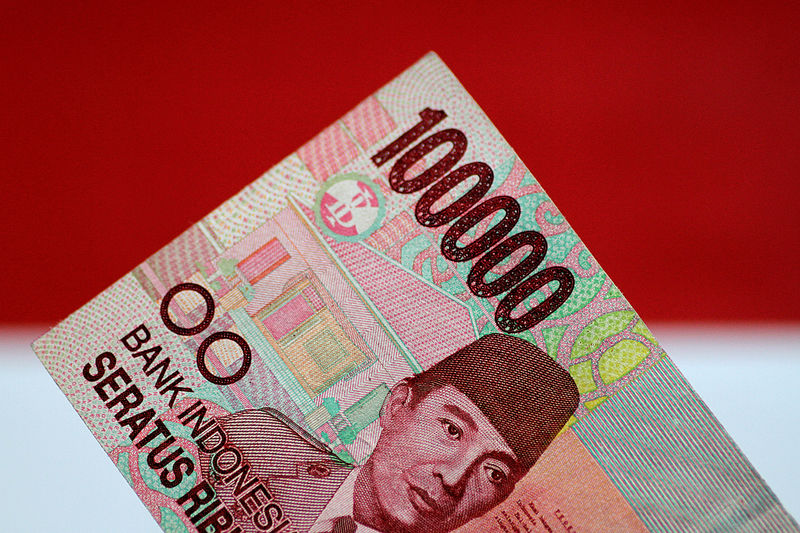 © Reuters. FILE PHOTO: Illustration photo of an Indonesia Rupiah note
© Reuters. FILE PHOTO: Illustration photo of an Indonesia Rupiah noteBy Gayatri Suroyo and Fransiska Nangoy
JAKARTA (Reuters) – The specter of financial market instability could force Indonesia’s central bank to raise interest rates later on Thursday even though the economy needs anything but monetary tightening.
In the month since Bank Indonesia last met and said it would be an “overkill or counterproductive” to be raising rates, consensus expectations have swiftly turned to suggest a rate rise is needed to put a floor under the falling rupiah.
Southeast Asia’s largest economy is one of the region’s worst affected by the combination of rising U.S. yields and higher oil prices, and has seen about $4 billion leave its markets over the past month as foreign investors review their exposure to higher-yielding emerging markets.
The rupiah
Thus, despite a slowing economy and benign inflationary pressures, economists are bracing for Bank Indonesia to raise its benchmark 7-day reverse repurchase rate on Thursday.
“It is not ideal for the central bank to raise rates to prevent the currency worsening, but seems like they have no choice,” said Ivan Chamdani, a fund manager at Maybank Asset Management in Jakarta. “It would be funny if they keep intervening in currency but they leave their stance loose, not hiking rates.”
In a Reuters poll, 13 of 21 economists predicted a rate hike at Thursday’s meeting, the last for Governor Agus Martowardojo.
“Policymakers from BI have signaled a clear shift in policy priority lately towards safeguarding financial stability, given the weakening rupiah,” Mizuho Bank’s Chang Wei Liang wrote.
“While FX reserves level remain relatively high by historical standards, defending the rupiah through selling off reserves will not be the optimal solution if rupiah consistently faces selling pressure.”
Bank Indonesia has tried to put a floor under the rupiah by intervening in both the currency and bond markets, but its foreign exchange reserves declined by $7.1 billion in February through April, and analysts said burning reserves may not be enough to support the currency.
A pre-emptive tightening would set Indonesia up with some cushion in its yields, should financial volatility in global markets escalate.
BALANCING ACT
If Indonesia raises rates
Frist-quarter growth was slightly below expectations, at 5.06 percent, as private consumption remained sluggish. Annual inflation rate edged up in April to 3.41 percent, but remained within BI’s 2.5-4.5 percent 2018 target range.
Financial stability is a big priority for an economy that was among the ‘fragile five’ emerging markets during the 2013 taper tantrum sell-off, and has a long history of volatile capital flows. Foreigners hold more than one-third of outstanding Indonesian government bonds.
Chamdani said foreign holdings are already low by historic standards. “They need rupiah stability to come back in, which unfortunately has to come partly from intervention and rate hike,” he said.
Bank of America Merrill Lynch (NYSE:) analysts Rohit Garg and Mohamed Faiz Nagutha said that even in an extreme scenario of capital outflows being as much as 20 percent of foreign exchange reserves, Indonesia would be better off than in 2013 and have enough reserves to fund 5-1/2 months of imports. At the end of April, reserves were $124.9 billion.
If reserves drop beyond $110 billion, pressure on BI to hike “will increase significantly,” they said in a note earlier this month.
Bearish bets on the rupiah are at the highest since October 2015 despite rate hike expectations, a Reuters poll showed on Thursday.
(This story was refiled to add dropped word ‘hike’ in seventh paragraph.)
Source: Investing.com





























